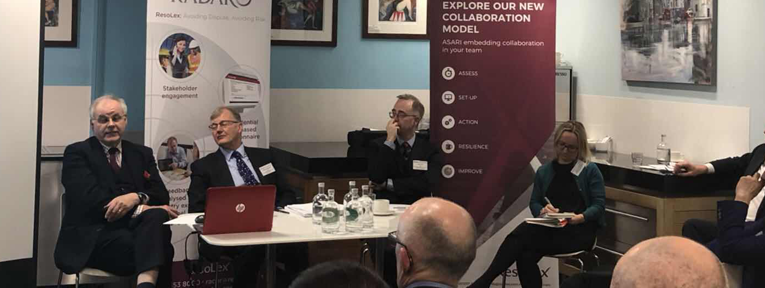Speakers:
- Nicola Walters | Assistant Director, Department for Business, Energy & Industrial Strategy
- Alan Kirk | Head of Commercial – Capital Delivery (Systems), TfL
- Rudy Klein | Chief Executive, Specialist Engineering Contractors Group
- Richard Bayfield | Consultant and Commercial Risk Director, Temple Group
The theme of this month’s discussion was around the consultations currently taking place on:
- The changes to Part 2 of the housing, grants and regeneration act.
- The Construction payments mechanism.
Nicola opened the session, explaining the purpose of the housing review is to understand the impact of the 2011 legislation and see if it needs tweaking. It is not currently envisaged that there will be any major changes.
The review of the payments mechanism is to look at the policy on retentions and understand the industry views on the extent to which monies retained by clients, and contractors should be protected to avoid misuse. The review will also look into the adjudication process to understand whether the system works for organisations further down the supply chain.
The speakers then picked up the topic to talk about the adjudication issue as it affects large clients. There was consensus that the system is not really working as originally intended, largely because:
- Cash flow is still a big problem despite the introduction of adjudication
- Adjudication itself has become more expensive than originally anticipated.
Richard highlighted the problem of drafting legislation which intrinsically requires a “one size fits all” approach. He used an example from a recent adjudication where the lack of legal/contractual sophistication was shown by correspondence supporting a “pay when paid” approach. He cited the large bandwidth within the industry from the “jobbing builder” work to the mega infrastructure projects.
Alan felt that it was important to see greater input to projects from the T2 and T3 subcontractors since they have the potential to add value if properly engaged.

It was noted that a number of public sector clients are unhappy with inconsistency between the commercial arrangements agreed with the T1 Contractors, and those further down the supply chain. This was a significant concern for them, as they were increasingly of the view that the value and innovation they were seeking would only likely to come from the subcontracting firms who delivered the works. Rudi was unhappy with the current contracting model of the major T1 contractors becoming cash management businesses that paid little attention to the productivity gains being sought.
The case was made for a simpler system for payment claims, as had recently been put in place in Ireland. More safeguards are also needed to prevent clients and main contractors introducing workaround clauses that essentially void the effect of trying to eliminate ‘pay when paid’ practices. Some other recommendations were:
- That the adjudicators should be able to decide their own jurisdiction.
- The scheme procedure should be specifically mandated
- There should be no extension past 42 days
- The industry should work towards an efficient ‘on-line’ approach.
Other thoughts
As usual with the Round Table events, the discussion that followed the short presentations was varied and insightful. Some of the noteworthy points are set out below.
The collapse of Carillion was felt to be highly unfortunate for many in the construction industry but was of sufficient scale that it was likely to provoke a call for significant change in the industry. The clear message to the government was that pushing risk down into the private sector had its limitations and should be re-assessed.
Similarly, the financial model of competing for work at extremely low margins was unlikely to ever produce the productivity gains that the agencies delivering major programs of infrastructure work were likely to achieve.
It was felt that the collaboration agenda in too many firms were focused on technical issues and tended to ignore the social/behavioural aspects that were fundamental to achieving a step change in productivity. (This was obviously well received by the ResoLex team who have been promoting this view for a while.)
Rudi summed up the evening with three areas for future focus for improvements across the construction industry. His three ‘P’s are;
1. Procurement – Look more closely at innovative procurement processes such as IPI. (see the notes from the November round table)
2. Payments. Set up project bank accounts for all major projects and look after the interests of all parties in the supply chain.
3. Professionalism. Introduce higher standards of behaviour and business practice.
